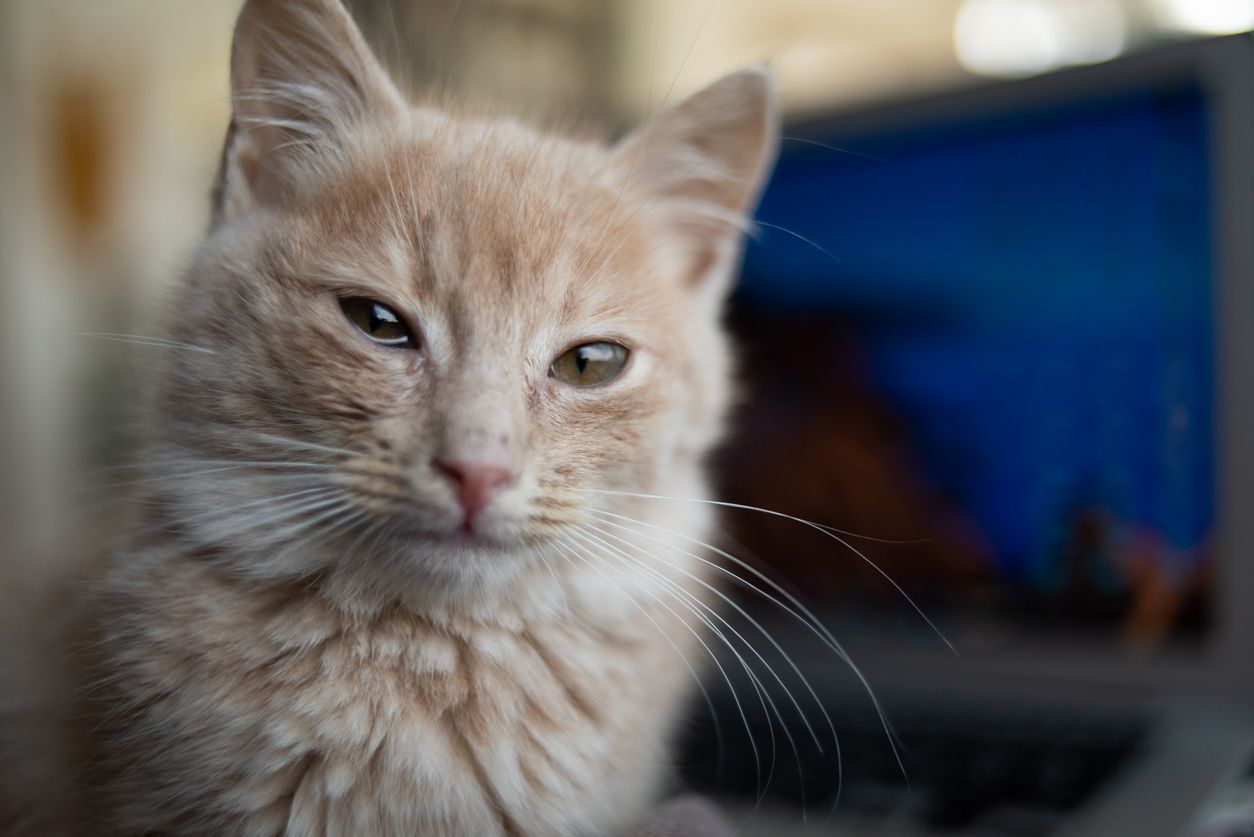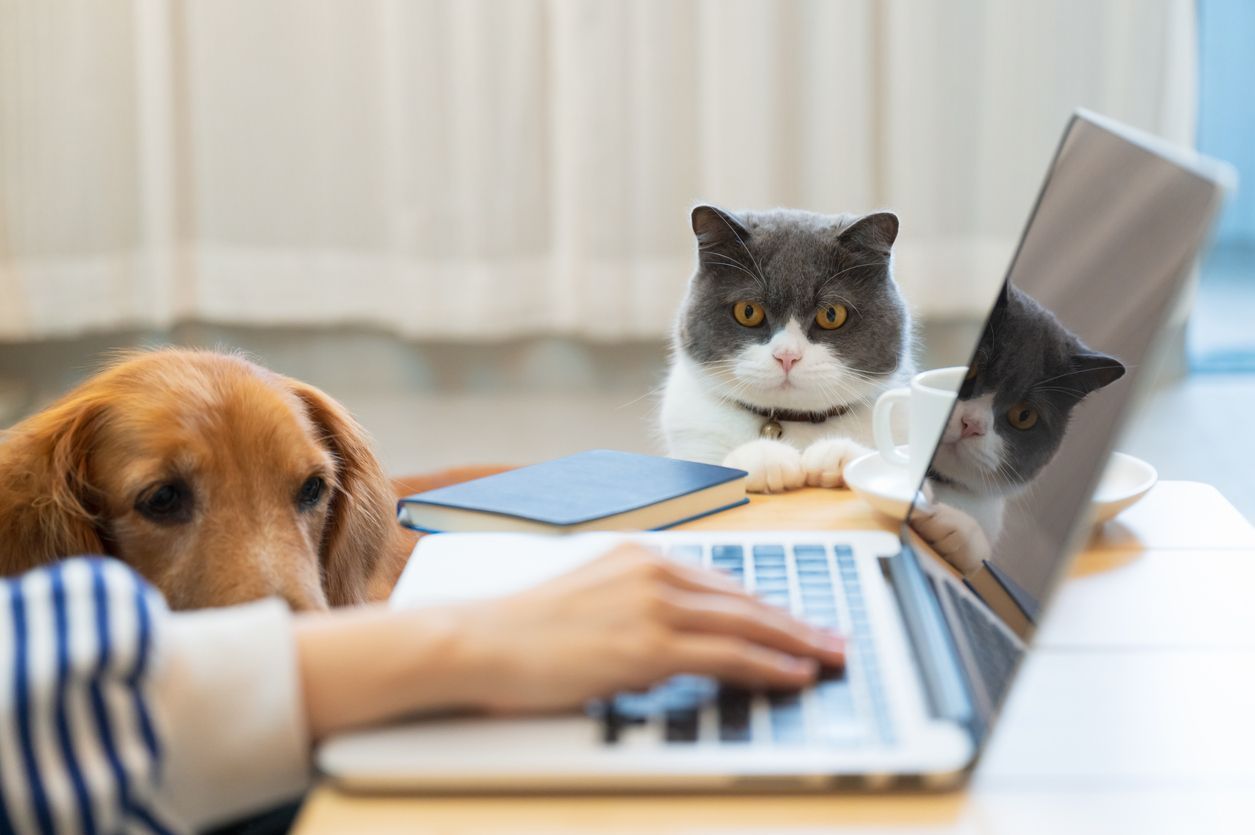Why are my cat’s eyes watering?

Watery eye discharge in cats is a common symptom with many potential causes, such as a respiratory infection, eye infection, injury to the eye, or other eye disorder. Temporary watery eyes can be a normal response to an irritant or may be a sign of a serious underlying health issue. Read on to learn about:
- Normal and abnormal eye discharge
- Common eye conditions that cause watery eyes
- How vets diagnose and treat watery eyes in cats
Upper respiratory infections are very common in cats and often have eye discharge as a symptom. Most respiratory infections in cats are caused by viruses such as feline herpesvirus and feline calicivirus. Other common causes of watery eye discharge in cats include bacterial infections of the eye, eye injuries, and conditions that lead to blocked tear ducts. It’s important to seek veterinary attention for your furry friend if they develop watery eyes to determine the underlying cause and receive prompt treatment to prevent infections or injuries from getting worse.
What is eye discharge?
Eye discharge is an abnormal drainage of fluid from the eyes. Ocular discharge can be a surplus of normal tears or could contain mucus, pus, blood, or other fluids varying in thickness and color. Tear glands, also called lacrimal glands, secrete a clear fluid to lubricate the eyes. This tear film flows across the surface of the eye, providing continuous protection and lubrication, and drains through ducts. Various diseases, irritants, and eye injuries can cause the lacrimal glands to release more tears than normal. Problems that block the ducts can also cause eye discharge as the tear film spills over the lids and runs down the cheek.
Watery eye symptoms in cats
Watery eyes are a common symptom in cats with many causes. Depending on the underlying health issue, watery eyes may be accompanied by other symptoms, such as:
- Coughing or sneezing
- Excessive blinking
- Inflammation of the eyelids or skin around the eyes
- Red, bloodshot, or cloudy eyes
- Squinting
- Nasal discharge
- Vomiting or diarrhea
- Lethargy
- Signs of pain in the eyes or face
It’s important to look for other signs of illness if you notice your cat has watery eyes. This can help a vet reach an accurate diagnosis and provide proper treatment.
Causes of eye discharge in cats
“In a healthy eye, tears are produced by the tear glands to lubricate the conjunctiva (outer lining) of the eye,” explains Dr. Jo Myers, a veterinarian on the Vetster platform. “Tears flow across the eye before draining down the tear duct and into the nasal cavity. Anything that interferes with normal tear drainage or tear production can result in a cat with weepy eyes.”
There are many underlying health issues that can cause clear, watery discharge from a cat’s eyes, ranging from relatively harmless to life-threatening. Many are caused by viral infections, bacterial eye infections, eye irritation, injuries to the eye, or eye disorders.
Respiratory or eye infections
Eye discharge is a common symptom of feline respiratory infections. These include, but are not limited to:
- Conjunctivitis
- Feline herpesvirus
- Feline calicivirus
- Feline chlamydia
- Bordetella (kennel cough)
Most cats with upper respiratory infections will have additional symptoms such as sneezing, nasal discharge, and lethargy. The majority of upper respiratory infections in cats are viral.
Tissues in and around the eyes can also be the primary site of infection for a number of disease-causing bacteria, viruses, and fungal pathogens.
Eye injuries and irritants
Eye injuries or irritants in the eye can make the eyes water in an attempt to protect themselves and flush out the irritant. They may also block the ducts that drain the tear film and cause tears to spill out over the lids and down the cheek. Eye irritants and injuries include:
- Corneal ulcers and scratches
- Foreign objects in the eye, such as pollen or grass seeds
- Airborne chemicals
- Eye cancer and tumors
- Inflammation or obstruction of the tear duct
Injuries to the eye vary in severity. It’s best to seek veterinary care as quickly as possible for eye injuries.
Tear duct disorders and genetic conditions
Eye disorders and genetic conditions that can lead to watery eyes in cats include:
- Dry eye
- Coloboma (a defect in the lens, iris, or retina)
- Eyelid and eyelash disorders
Brachycephalic breeds or cat breeds with flat faces are likely to have eye discharge from a blockage of the nasolacrimal duct due to their facial anatomy.
How vets diagnose the cause of watery eyes in cats
Watery eye discharge is a common symptom in cats with many potential causes. Veterinarians use a physical exam, eye examination, and other diagnostic tests to pinpoint the cause. Common conditions are often ruled out first with testing. An eye exam may include:
- Examining the eye with a light and magnifying lens in a dark room
- Fluorescein eye stain to check for corneal scratches and ulcers
- Schirmer tear test
- Intraocular pressure test
If a definitive diagnosis cannot be made with an eye exam alone, additional tests may be recommended, such as:
- Bloodwork
- Bacterial or fungal culture
- Cytology
- Biopsy
- Ultrasound
An accurate diagnosis is needed in order to provide an effective treatment plan.
Is cat eye discharge an emergency?
Watery eyes alone are not an emergency in cats. However, it is important to seek immediate veterinary attention if a cat is also showing:
If a cat has a large and obvious foreign object in their eye or an eye has popped out of the socket, it is an emergency. Even without emergency symptoms, any changes in eye health should be promptly treated by a veterinarian. Eye issues are commonly caused by an underlying health problem, such as infection or injury, that needs proper diagnosis in order to be treated. An untreated infection or injury can lead to permanent eye damage and other health consequences.
How eye conditions in cats are treated
Treatment options for feline eye conditions vary and may include:
- Eye drops or ointments that contain antibiotics, antifungals, or anti-inflammatories
- Oral medications such as antibiotics or pain relief
- Surgery
- Supportive care while waiting for a virus to run its course
Some conditions that cause watery eyes heal on their own and only require minor supportive care at home, such as applying warm compresses, feeding warm, wet food, or increasing heat and humidity to encourage healing. Minor irritants may flush out naturally with the cat’s tears. If prescribed medication by a veterinarian, continue to give it as instructed, even if the symptoms go away quickly. An unfinished course of medication can lead to an eye or systemic infection that is more difficult to treat later. Do not attempt to treat your cat’s eye symptoms with anything other than what a vet has prescribed or recommended. Wrapping a cat in a blanket or a towel and getting help from another person may help when administering eye medications. If you need help giving your cat their medication, an online vet can offer guidance in a virtual vet appointment.
What to do if your cat’s eyes are watering
It’s important to talk to a vet any time you notice changes in your cat’s eyes. Watery discharge from the eyes may simply be the eyes flushing out an irritant or a symptom of a mild infection. However, discharge from the eyes can also indicate a serious underlying health issue, especially if there are additional symptoms. Pay attention to any other symptoms your feline friend is having, as this can help a veterinarian when diagnosing the underlying problem. An online vet on the Vetster platform can help determine if your cat’s watery eyes are an emergency or offer guidance on an at-home eye exam to pinpoint the location of the problem.
FAQ - Why are my cat’s eyes watering?
Should I be worried if my cat’s eye is watering?
A bit of temporary eye watering can be a natural defense against minor irritation. However, watery eyes and eye discharge can also be a sign of disease or injury that needs medical treatment. If the watery eye does not go away quickly or if your cat shows other symptoms, it’s best to seek veterinary advice.
Why is water coming out of my cat’s eyes?
Eye irritation, injuries, or infectious disease can cause a cat’s eyes to water. These conditions vary widely in severity. It’s best to seek medical advice if a cat has other eye symptoms, signs of infection or illness, or if the wateriness does not go away quickly.
How do I treat my cat’s watery eyes?
Watery eyes can be caused by many health issues in cats. It’s best to seek veterinary help because it’s important to know what’s causing the watery eyes in order to know what kind of treatment will work. Attempting home treatment delays proper treatment and can allow the issue to get worse. In addition, improper treatment can increase the risk of eye damage.










